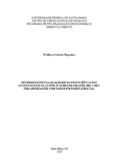| dc.creator | Siqueira, Wallace Lobato | |
| dc.date.accessioned | 2021-08-10T13:57:15Z | |
| dc.date.available | 2021-08-10T13:57:15Z | |
| dc.date.issued | 2020-05-18 | |
| dc.identifier.uri | http://repositorio.ufsm.br/handle/1/21865 | |
| dc.description.abstract | This dissertation presents a study on the determinants of quality of Brazilian education. It was verified the effects that the school infrastructure, the teacher qualifications, the characteristics of students and their families had on the mathematics performance of students in the 9th grade of elementary education in public schools in municipalities of Brazil. For this, were used data from SAEB and School Census between 2011 and 2017, using spatial panel methodology. The results showed that family conditions were the factors that most influenced the aver-age performance of students in SAEB at the municipal level in the period studied, especially about the mother's education. Because the proportion of mothers with more education had direct and indirect impacts, for neighbouring municipalities, demonstrating that the family background of a region can positively affect the local school performance and that of its neighbours. Regarding the parameters, the proportion of students who read often and do the exercises at home had positive effects and significant performed in the SAEB assessments, as well as the proportion of students who had their homework corrected by the teachers. In addition to these, there was a strong spatial dependence on the municipal grade in mathematics from the SAEB, noting that the spatial structure is relevant for determining the school performance of students at the municipal level in Brazil, where the performance of the municipality is positively associated with from the other municipalities, that is, there are positive overflows of internal variables for their neighbourhood. On the other hand, the residues had the opposite effect, in which shocks can decrease the average performance of the municipality in question, overflowing to its neighbours. | eng |
| dc.language | por | por |
| dc.publisher | Universidade Federal de Santa Maria | por |
| dc.rights | Attribution-NonCommercial-NoDerivatives 4.0 International | * |
| dc.rights.uri | http://creativecommons.org/licenses/by-nc-nd/4.0/ | * |
| dc.subject | Educação | por |
| dc.subject | Desempenho escolar | por |
| dc.subject | SAEB | por |
| dc.subject | Education | eng |
| dc.subject | School performance | eng |
| dc.title | Determinantes da qualidade da proficiência dos alunos das escolas públicas brasileiras de 2011 a 2017: uma abordagem com dados em painel espacial | por |
| dc.title.alternative | Determinants the quality of brazilian public school student proficiency from 2011 to 2017: a space panel data approach | eng |
| dc.type | Dissertação | por |
| dc.description.resumo | Esta dissertação apresenta um estudo sobre os condicionantes da proficiência escolar dos alunos em escolas públicas nos municípios brasileiros. Verificaram-se os efeitos que a infraestrutura física do ambiente escolar, a qualificação dos professores, as características dos alunos e de suas famílias exerceram no desempenho em matemática dos alunos do 9º ano do ensino fundamental das escolas públicas agregadas em municípios. Para isso, foram utilizados os dados do Sistema de Avaliação da Educação Básica (SAEB) e do Censo Escolar entre 2011 e 2017, sob a metodologia de dados em painel espacial. Os resultados apontaram que as condições familiares foram os fatores que mais influenciaram o desempenho médio dos alunos no SAEB em nível municipal no período estudado, principalmente no que se refere à escolaridade da mãe, de modo que a proporção de mães mais instruídas teve impactos tanto diretos quanto indiretos para os municípios vizinhos, demostrando que o background familiar de uma região pode afetar positivamente tanto o desempenho escolar local quanto o de outras regiões. Em relação aos demais parâmetros, a proporção de alunos que leem com frequência e fazem os exercícios para casa, em geral, tiveram efeitos positivos e significativos sobre o desempenho nas avaliações do SAEB, assim como a proporção de alunos que tiveram suas tarefas corrigidas pelos professores. Para além desses, verificou-se forte dependência espacial da nota municipal em matemática do SAEB, constatando que a estrutura espacial é relevante para determinação do desempenho escolar dos alunos na esfera municipal no Brasil, em que a performance do município nesse quesito está associada de forma positiva à dos demais municípios, ou seja, há transbordamentos positivos das variáveis internas para a sua vizinhança. Em contrapartida, os resíduos possuíram efeito inverso, em que choques podem diminuir o desempenho médio do município em questão, transbordando para seus vizinhos. | por |
| dc.contributor.advisor1 | Freitas, Clailton Ataídes de | |
| dc.contributor.advisor1Lattes | http://lattes.cnpq.br/6595942544054710 | por |
| dc.contributor.advisor-co1 | Becker, Kalinca Leia | |
| dc.contributor.referee1 | Casagrande, Dieison Lenon | |
| dc.contributor.referee2 | Pelegrini, Tatiane | |
| dc.creator.Lattes | http://lattes.cnpq.br/0969623695324912 | por |
| dc.publisher.country | Brasil | por |
| dc.publisher.department | Economia | por |
| dc.publisher.initials | UFSM | por |
| dc.publisher.program | Programa de Pós-Graduação em Economia e Desenvolvimento | por |
| dc.subject.cnpq | CNPQ::CIENCIAS SOCIAIS APLICADAS::ECONOMIA | por |
| dc.publisher.unidade | Centro de Ciências Sociais e Humanas | por |



